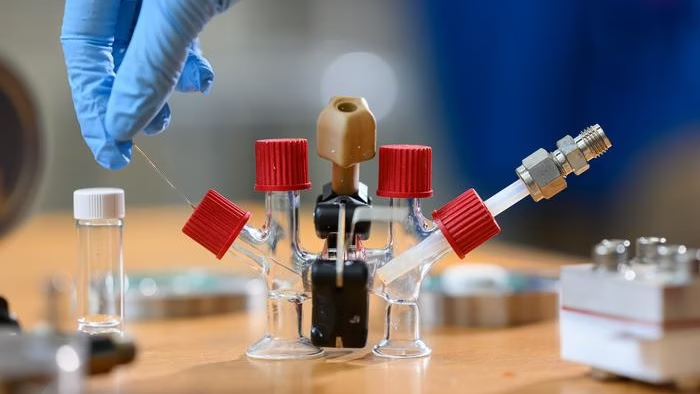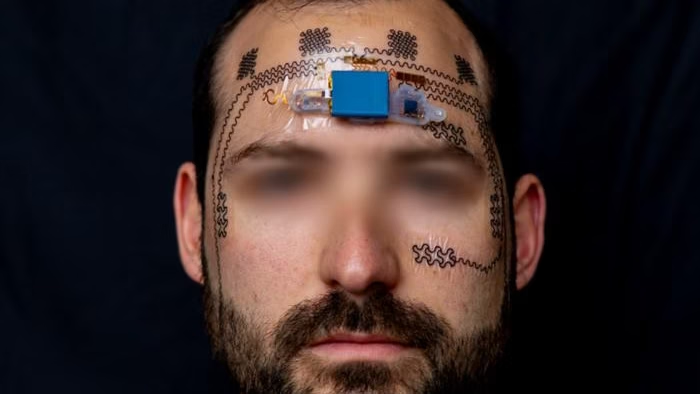Researchers at the University of Virginia, USA, collaborated with Lush to develop a shower routine that boosts creativity through mind-wandering.
From University of Virginia College and Graduate School of Arts & Sciences 11/07/24

Cognitive scientist and assistant professor of philosophy at UVA, Zachary Irving, has partnered with the cosmetic company Lush to develop a research-based shower routine that boosts creativity and aids in problem-solving.
In a 2022 paper published in the journal Psychology, Aesthetics, Creativity, and the Arts, cognitive scientist Zachary Irving, an assistant professor with the University of Virginia’s Corcoran Department of Philosophy, explored a phenomenon known as the shower effect, which explains why activities like showering or walking are effective at spurring creativity or helping with problem-solving.
Recently, his work captured the attention of executives at the international soap and cosmetics company Lush, who reached out to Irving for his help in launching a mind-wandering-themed shower campaign aimed at turning Irving’s research into something everyone can experience, but it’s also adding a new dimension to Irving’s research.
Irving, the world’s foremost philosopher of mind-wandering, if not its first, and an experimental philosopher who uses the tools of the social sciences to examine how complex scientific and philosophical concepts impact everyday existence.
His research develops a philosophical and scientific theory of what mind-wandering is, what it isn’t, and why it matters.
When he first started studying the phenomenon, he found that definitions of mind-wandering didn’t really capture the nature of the experience.
“What they were focused on was distraction in general,” Irving said.
“They were defining mind-wandering as what are called task-unrelated thoughts — in other words, anything that distracts you.”
“Those seemed very different to me, both from a philosophical standpoint but also from the point of view of how people think about mind-wandering.”
And rather than thinking that there’s an unconscious process at work or one more actively engaged in problem-solving, Irving explained that mind-wandering is a conscious state, it’s just one that’s not focused — one in which free association happens naturally and without constraints.
“The issue with focusing on problem-solving is that you’re focusing on what you think is relevant about the problem and what you think is important, but sometimes you’re wrong,” Irving said.
“When your mind is wandering almost randomly, that’s when you hit upon unusual or creative ideas that you otherwise would have ignored.”

Irving’s empirical studies of the phenomenon led him to conclude that mind-wandering can aid creativity and that it can be induced by performing moderately engaging activities like taking a walk, washing the dishes, or taking a shower.
After his paper was published, Irving was contacted by product experts at Lush — a British cosmetics and soap retailer offering visually appealing products that combine fresh ingredients and minimal packaging — about the prospect of collaborating on a marketing campaign called the “Power of the Shower,” for which Irving – who may also be the world’s first philosophical cosmetics influencer – helped develop a shower routine using Lush products, one specifically designed to induce mind-wandering.
The process involves creating a multisensory experience aimed at interrupting daily worries and obsessive thoughts and inducing both relaxation and a state of mind conducive to free association.
“This is one of the most exciting partnerships we’ve done,” said Erica Vega, a brand and product manager with Lush.
“Being able to integrate the colours, textures, and essential oils of Lush products into a powerful mind-melting experience like this is such a fun new way to think about taking care of the body and the mind.”
But the partnership has also added a new dimension to Irving’s research.
In the lab, it’s possible to induce emotional states that are simply good or simply bad in research subjects, but to explore the kind of specific emotional states necessary to induce mind-wandering, Irving needs to induce more nuanced emotions, and Lush’s product developers already have experience developing scents and sensations that do just that.
“The beauty product industry is focused on how to induce very specific emotions: how to make you experience relaxation or how to induce the sensation of wonder,” Irving said.
It can be difficult for researchers to replicate more subtle states of mind reliably enough to conduct meaningful research, Irving said.
“But the specificity of emotions that they’re able to create is really important for what I’m trying to do.”
Irving also noted that his partnership with Lush is especially unique in that it’s a rare opportunity for a philosopher to do work that the public can benefit from without having to read a scholarly paper.
“As a philosopher, you don’t get that very often,” Irving said.
“This way, you can experience the philosophy just by taking a shower.”
Dean of the College and Graduate School of Arts & Sciences, Christa Acampora, said, “As dean, I know that our faculty in Arts & Sciences are engaged in research and creative activities that impact virtually every dimension of our lives.”
“It is rewarding to see this captivate the attention of others with the result of such a surprising partnership with industry.”
“I applaud professor Irving’s efforts and creativity in engaging the public in the work that philosophers do while also demonstrating its relevance to their everyday lives.”
More info
https://www.lush.com/us/en_us/a/the-power-of-the-shower
You may also be curious about:
-

Viral mouth-taping trend ‘sus’ says Canadian sleep expert
-

New sodium fuel cell could enable electric aviation
-

The most extreme solar storm hit Earth over 14,000 years ago, scientists identify
-

Electronic face tattoo gauges mental strain
-

Solitonic superfluorescence paves way for ambient temp quantum computing
-

Cosmic mystery deepens as astronomers find object flashing in both radio waves and X-rays
-

The rotors are also the wheels on this morphobot
-

Bed bugs are most likely the first human pest, 60,000 years and counting
-

What lurks beneath? Only 0.001 percent of the deep seafloor has been imaged
-

Ultrasonic wireless charging for implanted medical devices
-

New larvae-attracting gel could boost coral reef restoration
-

30 percent weight loss in mice by restricting one amino acid
